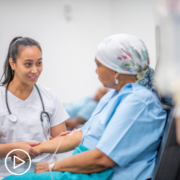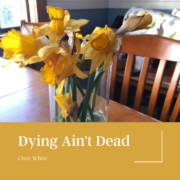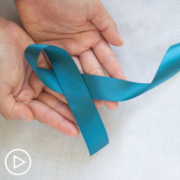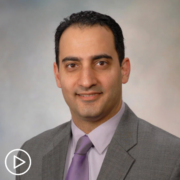Endometrial Cancer Care Disparities: The Impact of Rural Residence
Endometrial Cancer Care Disparities: The Impact of Rural Residence from Patient Empowerment Network on Vimeo.
What kind of care disparities do endometrial cancer patients from rural areas face? Expert Dr. Emily Hinchcliff from Northwestern Medicine shares her perspective on obstacles for patient care in rural areas and patient advice to help ensure optimal care.
Download Guide | Descargar Guía en Español
See More from [ACT]IVATED Endometrial Cancer
Related Resources:

Which Endometrial Cancer Clinical Trials Are Showing Promise? |

Understanding Endometrial Cancer Risk: Factors Influencing Incidence and Mortality |

Overcoming Geographical Barriers in Endometrial Cancer Care |
Transcript:
Lisa:
Dr. Hinchcliff, can you speak to barriers faced by rural endometrial cancer patients, those living in rural areas, and are there specific challenges that these women in rural areas face in accessing timely and quality healthcare services for endometrial cancer screening and treatment?
Dr. Emily Hinchcliff:
Absolutely. So, when I think of barriers, I think that barriers can be broken into some really key steps along the kind of diagnosis continuum. So certainly, a patient needs to understand that the symptom that they’re having is a problem. Then they need to see that problem and seek care. Then once they have established care they need to obtain a diagnosis. And then once you have a diagnosis, you need to get treated. And so I would suspect that those living remote from major hospital centers or from subspecialty care probably experience delays at each single one of those time points.
First, I think a knowledge gap probably exists about what bleeding should be, especially for postmenopausal women. Postmenopausal bleeding is not normal. And so even a small episode of spotting should warrant a visit to your physician. And then I think for those who see their physician, who have a less kind of either geographic or less access for whatever reason, there’s probably a greater prolongation of the series of visits that are required before they get the necessary endometrial sampling and a transvaginal ultrasound, which are really core tests when it comes to diagnosis.
Once the diagnosis is obtained, I think that the further referral and potential delay to someone like myself, like a GYN oncologist, is also a key barrier for those who are rural. There’s actually a really good study in gynecologic specifically in the Midwest that showed that rural women were significantly less likely to receive care from a subspecialist like myself. I think that particular study was in endometrial, sorry in ovarian cancer, but it showed that those who receive care by a specialist are more likely to get optimal surgery and to get guideline-inherent care. So getting yourself to that subspecialist, I think is really key, but can be difficult for women who live remote from subspecialty care.





![[ACT]IVATED Endometrial Cancer Resource Guide [ACT]IVATED Endometrial Cancer Resource Guide](https://powerfulpatients.org/wp-content/uploads/ACTIVATED-Endometrial-Cancer-Resource-Guide-180x180.png)




